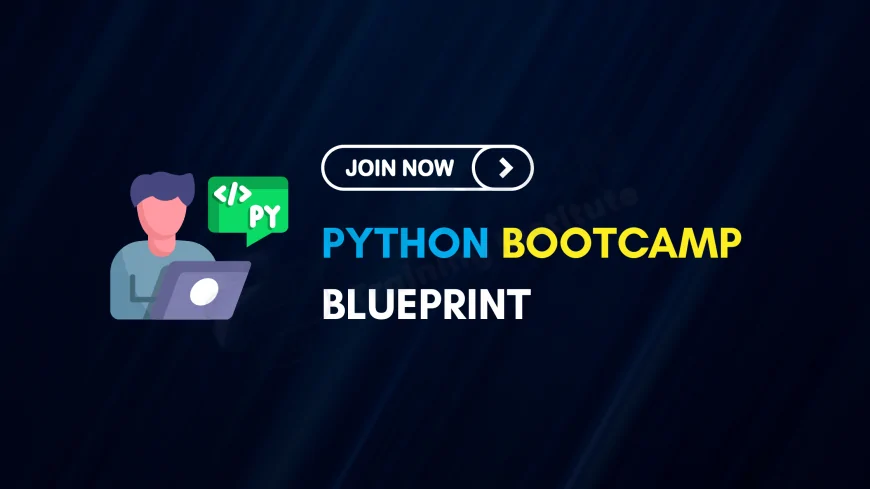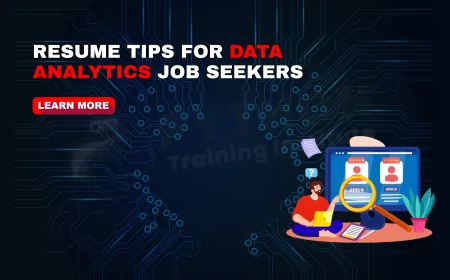Comprehensive Guide: Topics Covered in Python Bootcamps for Beginners
Discover what topics are covered in Python bootcamps, including real-world projects, web development, data structures, APIs, and more. Learn from the best at the Python Training Institute in Pune and boost your IT career with hands-on, beginner-friendly learning paths.

Python has emerged as one of the most versatile and widely-used programming languages in the tech industry. Its simplicity and readability make it an ideal choice for beginners, while its powerful libraries and frameworks cater to advanced applications in data science, web development, automation, and more. Python bootcamps have gained popularity as intensive training programs designed to equip learners with practical skills in a short time frame.
In this blog, we'll explore the comprehensive topics covered in Python bootcamps, providing a roadmap for aspiring developers and professionals looking to upskill.
1. Python Fundamentals
a. Syntax and Semantics
Understanding Python's syntax is the first step. Bootcamps cover.
-
Variables and Data Types: Integers, floats, strings, booleans.
-
Operators: Arithmetic, comparison, logical, bitwise.
-
Comments and Docstrings: Writing readable and maintainable code.
b. Control Structures
Control structures dictate the flow of a program:
-
Conditional Statements:
if,elif,else. -
Loops:
for,while, and loop control statements likebreak,continue,pass.
c. Data Structures
Efficient data handling is crucial:
-
Lists: Ordered, mutable collections.
-
Tuples: Ordered, immutable collections.
-
Dictionaries: Key-value pairs for fast lookups.
-
Sets: Unordered collections of unique elements.
2. Functions and Modules
a. Defining and Calling Functions
Functions promote code reusability:
-
Function Definition: Using
defkeyword. -
Parameters and Arguments: Positional, keyword, default, variable-length.
-
Return Statement: Returning values from functions.
b. Scope and Namespace
Understanding variable accessibility.
-
Local vs. Global Scope: Variable lifetime and accessibility.
-
globalandnonlocalKeywords: Modifying variable scope.
c. Modules and Packages
Organizing code efficiently.
-
Importing Modules: Standard library and third-party modules.
-
Creating Packages: Structuring code into reusable components.
3. Object-Oriented Programming (OOP)
OOP is a paradigm that models real-world entities:
-
Classes and Objects: Blueprints and instances.
-
Attributes and Methods: Data and behavior encapsulation.
-
Inheritance: Deriving new classes from existing ones.
-
Polymorphism: Methods behaving differently based on context.
-
Encapsulation: Restricting direct access to object data.
4. Error Handling and Debugging
Robust programs handle errors gracefully:
-
Exceptions:
try,except,finallyblocks. -
Custom Exceptions: Defining user-specific error types.
-
Debugging Tools: Using debuggers and logging for troubleshooting.
5. File Handling
Interacting with files is a common task:
-
Reading and Writing Files: Using
open(),read(),write(),close(). -
Working with Different File Types: Text, CSV, JSON.
-
Context Managers: Using
withstatement for file operations.
6. Working with Libraries and Frameworks
Python's ecosystem is rich with libraries:
-
NumPy: Numerical computations.
-
Pandas: Data manipulation and analysis.
-
Matplotlib and Seaborn: Data visualization.
-
Requests: HTTP requests handling.
-
BeautifulSoup: Web scraping.
7. Web Development
Building web applications is a key skill:
-
Flask: Lightweight web framework.
-
Django: High-level web framework for rapid development.
-
RESTful APIs: Designing and consuming APIs.
-
Frontend Integration: Connecting with HTML, CSS, JavaScript.
8. Data Science and Machine Learning
Python is a leading language in data science:
-
Data Analysis: Using Pandas for data manipulation.
-
Data Visualization: Creating plots with Matplotlib and Seaborn.
-
Machine Learning: Implementing algorithms with scikit-learn.
-
Deep Learning: Using TensorFlow and Keras for neural networks.
9. Automation and Scripting
Automating tasks enhances productivity:
-
Web Scraping: Extracting data from websites.
-
Automating File Operations: Renaming, moving, and organizing files.
-
Email Automation: Sending emails using SMTP.
-
Task Scheduling: Automating tasks with schedulers.
10. Testing and Deployment
Ensuring code reliability and deploying applications:
-
Unit Testing: Writing tests using
unittestorpytest. -
Continuous Integration: Automating testing and deployment.
-
Docker: Containerizing applications.
-
Cloud Deployment: Deploying apps on platforms like AWS, Heroku.
11. Capstone Projects
Applying learned skills in real-world projects:
-
Web Applications: Building full-stack applications.
-
Data Analysis Projects: Analyzing datasets and presenting insights.
-
Automation Tools: Creating scripts to automate tasks.
-
Machine Learning Models: Developing predictive models.
FAQ's
1. What are the core topics taught in a Python bootcamp in Pune?
Python bootcamps in Pune cover variables, data types, control flow, functions, file handling, and object-oriented programming. At the Python Training Institute in Pune, the curriculum is hands-on and career-focused, helping learners build a strong coding foundation for IT and software development roles.
2. Do Python bootcamps in Pune include data structures and algorithms?
Yes, reputable bootcamps such as those at the Python Training Institute in Pune focus heavily on data structures like lists, dictionaries, sets, and also teach algorithms. This builds logical thinking and problem-solving skills essential for coding interviews and job placement.
3. Are web development skills part of Python bootcamp training?
Absolutely. Python bootcamps in Pune often include Flask and Django frameworks to build web applications. The Python Training Institute in Pune emphasizes full-stack development skills to improve employability in startups and tech firms.
4. Do Python bootcamps teach object-oriented programming (OOP)?
Yes, OOP is a major module in any Python bootcamp. At Python Training Institute in Pune, students learn to create real-world applications using classes, inheritance, and encapsulation, which are crucial for backend and software engineering roles.
5. Will I learn to work with databases in a Python bootcamp?
Definitely. Python bootcamps in Pune typically include working with SQL and database connectivity using libraries like sqlite3 or ORM tools. Python Training Institute in Pune ensures students can integrate backend apps with databases, a key industry requirement.
6. Do Python bootcamps in Pune teach APIs and backend integration?
Yes. Python Training Institute in Pune includes RESTful API development using Flask or Django. You'll learn to send and receive data, authenticate users, and build scalable backend services—valuable skills in modern software development.
7. Are Python bootcamps suitable for absolute beginners?
Yes, Python bootcamps in Pune are beginner-friendly and designed for those with no coding experience. Institutes like Python Training Institute in Pune begin with programming basics and build up to advanced topics, making them ideal for freshers and career changers.
8. Will I learn Python libraries like NumPy and Pandas in the bootcamp?
Yes, essential libraries such as NumPy and Pandas are included. The Python Training Institute in Pune incorporates data manipulation, analysis, and real-time case studies to prepare students for roles in data analytics and business intelligence.
9. Do bootcamps cover data visualization topics?
Absolutely. Python Training Institute in Pune includes libraries like Matplotlib and Seaborn to help students create meaningful visualizations. These skills are crucial for data storytelling and analytical roles across industries.
10. Are automation and scripting covered in Python bootcamps?
Yes. Scripting with Python is a key component of the bootcamp at the Python Training Institute in Pune. Students learn to automate daily tasks, file handling, web scraping, and even basic system administration scripts.
11. Is machine learning part of Python bootcamps in Pune?
Many bootcamps offer optional modules or advanced tracks in machine learning. Python Training Institute in Pune offers scikit-learn, model-building, and project-based learning for those aiming for AI or data science roles.
12. Will I work on real-world projects during the bootcamp?
Yes, project-based learning is core to Python Training Institute in Pune. You’ll build applications like calculators, web apps, dashboards, and mini-ML models to boost your portfolio and job readiness.
13. Is testing and debugging included in Python bootcamp curriculum?
Yes, bootcamps at Python Training Institute in Pune teach unittest, debugging tools, and writing test cases. This is crucial for writing production-ready, error-free code and succeeding in QA, DevOps, or backend roles.
14. Are DevOps or deployment skills taught in Python bootcamps?
While not always core, many advanced bootcamps at Python Training Institute in Pune teach basics of CI/CD pipelines, Docker, and deploying Python apps to Heroku or AWS, providing a full development-to-deployment understanding.
15. Will I learn to use Git and GitHub in a Python bootcamp?
Yes, version control using Git and collaboration via GitHub is part of the training. Python Training Institute in Pune emphasizes these tools so students can manage projects, track code changes, and work in teams effectively.
16. How is problem-solving taught in Python bootcamps?
Bootcamps focus on logic-building exercises, coding challenges, and algorithmic thinking. Python Training Institute in Pune includes hands-on coding labs to strengthen analytical skills required in technical job interviews.
17. Are interview preparation and coding assessments part of the curriculum?
Yes. Python Training Institute in Pune integrates mock interviews, aptitude tests, and Python coding challenges into the bootcamp. This prepares students for both technical and HR rounds in job placements.
18. Can I learn GUI development in Python bootcamps?
Some Python bootcamps cover Tkinter or PyQt for GUI applications. At Python Training Institute in Pune, optional GUI modules help students build desktop apps, adding diversity to their skill set.
19. Do Python bootcamps include Python for IoT or hardware programming?
Advanced bootcamps may offer optional Raspberry Pi or MicroPython training. Python Training Institute in Pune occasionally introduces such topics through workshops for those interested in embedded systems and IoT.
20. Will I get exposure to cloud platforms in Python bootcamps?
Yes, in advanced or career-track bootcamps, students at Python Training Institute in Pune get to deploy apps to cloud platforms like AWS or Google Cloud, which is essential for cloud-native development.
21. Are bootcamps in Pune aligned with Python certification exams?
Yes. Python Training Institute in Pune aligns its bootcamp curriculum with PCEP and PCAP certifications. Students are trained for both skill mastery and globally recognized certification exams.
22. Is Django REST framework part of the curriculum?
In full-stack or backend-focused bootcamps, yes. Python Training Institute in Pune includes Django REST framework for creating robust APIs used in enterprise and startup backend development.
23. Will I build a portfolio during the bootcamp?
Absolutely. Students at Python Training Institute in Pune create GitHub repositories of their capstone projects, code samples, and apps to showcase during interviews and to potential employers.
24. Are Python bootcamps enough to get a job?
Yes, especially with a hands-on, project-based bootcamp from Python Training Institute in Pune. The combination of real-world projects, career guidance, and placement support makes it possible to land entry-level tech roles.
25. What are the career benefits of completing a Python bootcamp in Pune?
Graduates from the Python Training Institute in Pune often secure jobs in software development, data analysis, web development, and automation. The bootcamp’s practical approach and placement support offer a fast-track into IT careers.
Python Certification is Just the Beginning
Python bootcamps offer a structured and intensive learning path, covering a wide array of topics from basic syntax to advanced applications in web development, data science, and automation. By participating in a bootcamp, learners can acquire practical skills, work on real-world projects, and prepare for a successful career in the tech industry.
The topics covered in Python bootcamps may vary based on the institution and the specific focus of the program. It's advisable to review the curriculum of individual bootcamps to ensure alignment with your learning goals.
What's Your Reaction?
 Like
0
Like
0
 Dislike
0
Dislike
0
 Love
0
Love
0
 Funny
0
Funny
0
 Angry
0
Angry
0
 Sad
0
Sad
0
 Wow
0
Wow
0















